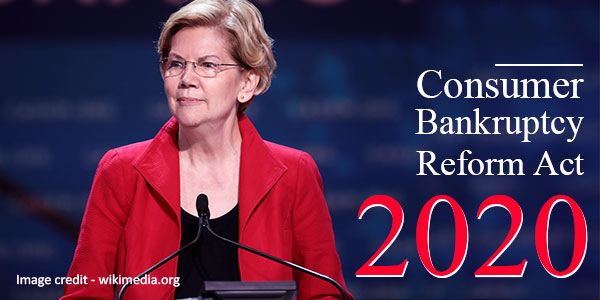The Consumer Bankruptcy Reform Act of 2020 (“CBRA”) has been proposed by two Congressional Democrats, Elizabeth Warren from Massachusetts and Jerrold Nadler from New York. The Act has proposed sweeping changes to current Bankruptcy provisions, and it could prove to be very beneficial to consumers. Here are 5 reasons why this is a game-changer.
Worried about your student loans? No more.
The CBRA seeks to amend Section 523, allowing consumers to discharge both federal and private student loan debts. These debts are currently treated as non-dischargeable debt, and the amendment seeks to treat the student loans as other unsecured consumer debts. According to attorney Lyle Solomon of Oak view law group, “At my practice, I see a lot of student loan debt disasters. With 1.7 trillion in national student loan debt, this is an urgent crisis”
Discharges with Minimum Payment Obligations after Plan confirmation
The CBRA will allow consumers to get their discharges right after the plan to pay their creditors back is confirmed. Currently, discharges only take place if the consumer has made the payments. The CBRA will also help a consumer to make payment plans based on their income and non-exempt assets. However, as per the proposed law, the payment plans must have an obligation of payment within three years. These plans will be confirmed as long as they are fair and done in good faith.
Focus on the ability to pay
As mentioned in the previous point, the CBRA proposes that importance should be laid on the consumer’s actual ability to pay back to the creditors by considering their income and any non-exempt assets. This will do away with the current law, where consumers that purchase luxury goods are usually moved on to different chapters upon filing for bankruptcy or even dismissed as being abusive if they are buying any luxury goods.
Removal of Mandatory Credit Counseling Course
Under the present bankruptcy law, consumers have to take a mandatory credit counseling course and file a certificate of completion in their bankruptcy cases to get a discharge. However, this forces people to take it even if they know the law and the requirements; hence CBRA proposes to do away with this mandatory provision.
Long wait times? No more
Under the current bankruptcy provision of a Chapter 7 filing, a consumer generally gets their discharge at around 90 days. Under Chapter 13, the wait is even longer as there is a necessity to complete the full repayment under a three-year or a five-year plan. However, under the CBRA, consumers who do not have enough non-exempt assets or income to pay back their creditors can get an immediate discharge after the payment of a minimum payment obligation. This will help consumers skip the long waiting periods they generally have to face under the current Bankruptcy provisions.
Finally, the power is back in the hands of the consumers and away from the large predatory credit card companies, payday loan lenders, and every other predatory loan business out there.









